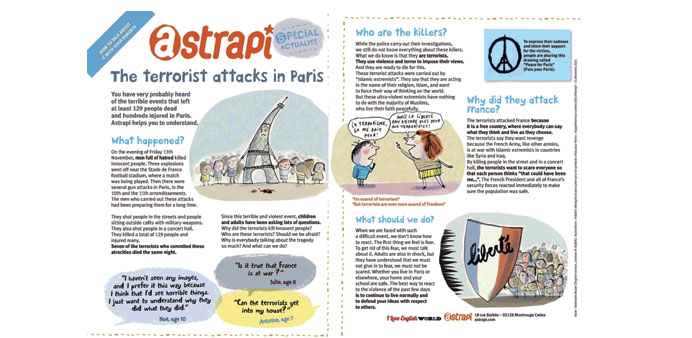The English version of the online document realised by French children’s magazine astrapi, written by journalist Gwenaelle Boulet (English version by Lemisse al-Hafidh) and illustrated by cartoonist Frederic Benaglia. French teachers are using the cartoon image of a weeping Eiffel Tower to help young children understand what happened in last Friday. The image of a grieving, humanised Eiffel Tower holding hands with young children and gazing at a pool of blood appears in a special online edition of the astrapi paper.
Reuters
Paris
French teachers are using the cartoon image of a weeping Eiffel Tower to help young children understand what happened in last Friday’s attacks in Paris that killed at least 129 people.
The image of a grieving, humanised Eiffel Tower holding hands with young children and gazing at a pool of blood appears in a special online edition of the astrapi paper that explains how “men full of hate” carried out the attacks.
“What we know is that these were terrorists, people who use violence and terror to impose their ideas,” says the text of the online paper, which is aimed at young children. “The first thing we feel is fear. To make sure that does not stay inside us, we have to talk about it.”
The online paper also includes children’s comments.
“Can the terrorists get into my house?” asks seven-year-old Antoine.
“Is it true that France is at war?” asks Julie, aged eight.
Ten-year-old Noel says: “I haven’t seen any images, and I prefer it this way because I think that I’d see horrible things.”
The education ministry has tweeted the cartoon featuring France’s most famous monument and included material from the online paper in a briefing given to teachers who spoke to children of the events when they returned to school on Monday.
Mon Quotidien, a paper aimed at older children, included a map of the Middle East showing the parts of Syria and Iraq now occupied by Islamic State.
France has a strong tradition of keeping religion out of state education, a policy criticised in some quarters for helping fuel mistrust and fear of its Muslim community, the largest in Europe.

